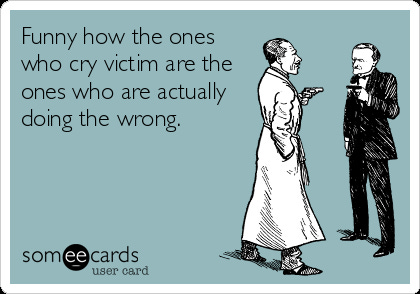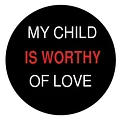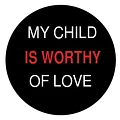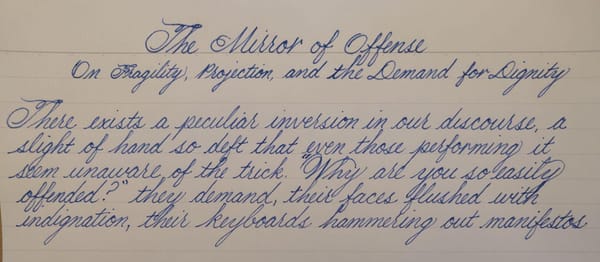Wallowing in Sorrow
A Parent's Example of Martyrdom and Misrepresentation
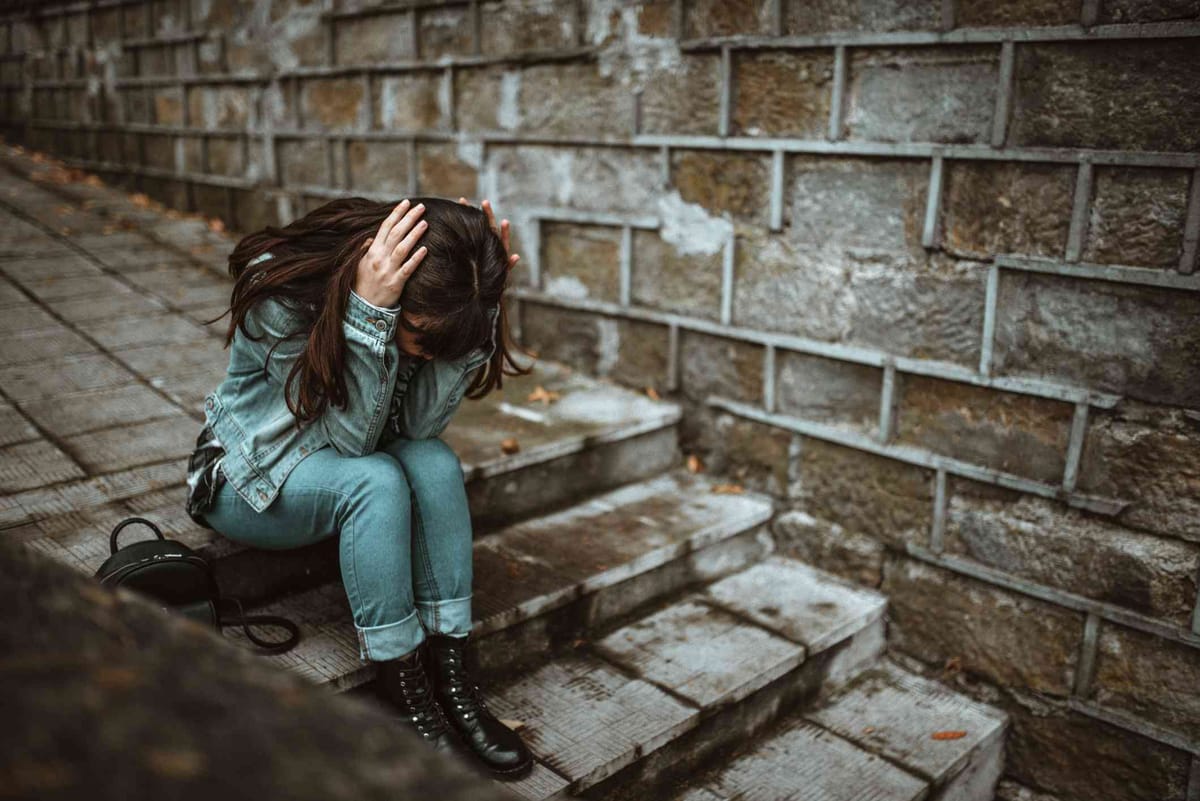
In yet another heart-wrenching installment of parental self-pity, the brave author of "Sorrow" takes us on an updated journey through the unrelenting anguish of having a transgender child. Two years after her initial foray into the realm of martyrdom, our intrepid parents continue to navigate the treacherous waters of their son's (is that daughter’s now?) transition, armed only with a steadfast commitment to own prejudice and a flair for the melodramatic.
The tenacious grip of sorrow, it seems, lurks around every corner and overshadows all things - particularly when you never stopped looking for it in the first place. From the minefield of the grocery store to the haunted halls of their home, our protagonist heroically perseveres, forever reminded of the cruel and ambiguous loss of their son daughter to the nefarious forces of gender ideology. The specter of their child's "dead" name looms large, a constant reminder of the unspeakable tragedy that has befallen this once-happy family.
But fear not, dear readers, for our author is quick to remind us of the hierarchy of parental suffering. While some may lose their children to mere trifles like accidents, illness, or war, this parent's pain is of a far more existential nature. The ambiguous loss of a child to the "trans cult" is a fate worse than death itself, a wound that festers and oozes with each passing day.
And yet, in the face of such unimaginable adversity, our protagonist remains a bastion of strength and self-righteousness. They valiantly refuse to succumb to the siren song of correct pronouns, bravely misgendering their son daughter at every turn. After all, what could be more narcissistic than expecting one's own parent to respect their identity and autonomy?
But the true villain of this piece, dear readers, is none other than the insidious specter of autism. Our author courageously suggests that their son's daughter’s neurodivergence has rendered him her a helpless pawn in the grand conspiracy of gender ideology, a mere puppet dancing on the strings of the "trans agenda." Never mind the countless autistic individuals who have found joy and authenticity in embracing their true selves – in this parent's world, autism is nothing more than a convenient scapegoat for their own failings.
But amidst all this self-commiseration and hand-wringing, our author makes a truly startling revelation: their once-promising son daughter, so full of potential and brilliance, has been utterly destroyed by the scourge of gender ideology. Never mind that this young man has bravely embarked on a journey of self-discovery and authenticity – in our protagonist's eyes, his transition is nothing short of a tragic waste of potential.
Yes, dear readers, it seems that in the world of "gender-critical" parenting, being transgender is the ultimate character flaw. All those years of academic achievement, all those glimmers of talent and promise – all of it wiped away in an instant by the unforgivable sin of living one's truth. Our author mourns the loss of the child they thought they had, as if their son's daughter’s identity were nothing more than a cruel trick played by the universe.
But fear not, for our protagonist is not one to let reality stand in the way of a good narrative. They boldly ignore the countless examples of transgender individuals who have gone on to lead rich, fulfilling lives – scientists, artists, activists, and leaders who have made indelible contributions to the world. In the myopic world of this parent's sorrow, such possibilities do not exist. There is only the bleak certainty of a life wasted, a potential squandered.
And let us not forget the sheer artistry of our author's metaphors. From the "polluted tornado" of their son’s daughter’s transition to the "open festering wound" of their own sorrow, this parent's prose is a veritable masterclass in hyperbole and self-indulgence. One can only marvel at the sheer depth of their anguish, so vividly rendered in a tapestry of overwrought similes and tortured analogies.
And so, our author soldiers on, bravely clinging to their prejudices in the face of all evidence to the contrary. They stubbornly refuse to see their son daughter for the strong, resilient, and courageous individual she truly is, preferring instead to wallow in the fictional tragedy of their own making. And all the while, they remain blissfully unaware of the real tragedy unfolding before their eyes – the tragedy of a parent's love conditional upon their child's conformity to their narrow expectations or rigid beliefs.
But perhaps the true tragedy of this piece lies in the author's own martyrdom and emotional masochism. Bravely shouldering the burden of their own leukemia diagnosis, they selflessly ponder whether the stress of their relentless denial of their son's daughter’s identity may have caused their illness. It's as if they revel in their own suffering, finding a perverse sense of validation in the idea that their intolerance has taken a physical toll.
This, dear readers, is a prime example of defining yourself in essence by way of a bad thing, a trauma that happened in the past that you've let define you. It's unhealthy, and it's a sign that you have some serious issues to work out – not your trans kid. By wallowing in their own misery and using their illness as a backdrop for their self-victimization, the author reveals the depths of their own unresolved pain and prejudice.
One can only weep at the injustice of it all – a parent, stricken down by the very cancer of their own intolerance, yet still clinging to their pain like a badge of honor, rather than doing the hard work of introspection and growth that might lead them to a place of genuine understanding and acceptance.
And so, dear readers, let us all take a moment to bask in the glow of this parent's unparalleled suffering. Let us marvel at their steadfast commitment to their own narrow-mindedness, their unwavering dedication to the art of the throwing one’s self a pity party. And let us all aspire to one day reach the dizzying heights of martyrdom and misgendering that this brave soul has so fearlessly scaled.
But in all seriousness, let this be a cautionary tale. A reminder of the dangers of allowing our own prejudices and preconceptions to blind us to the truth of our children's lives. A warning against the temptation to wallow in our own sorrow, rather than opening our hearts to the possibility of growth and understanding.
To the transgender individuals reading this: know that your existence is not a tragedy, no matter what narrow-minded "gender-critical" parents may say. Your potential is limitless, your contributions invaluable, and your identity a source of pride and strength. Do not let the misguided sorrow of others dim the brilliant light of your authenticity.
And to the author of "Sorrow," and all those who share their views: your pain is valid, but so too is your child's truth. Your children are not lost to you. They are right there in front of you, waiting for you to see them, to hear them, and to love them for who they truly are. The only thing standing in the way of your relationship is your own stubborn refusal to open your heart and mind to the beautiful reality of your child's identity.
The path forward lies not in denial and self-pity, but in empathy, education, and unconditional love. Only then can we hope to heal the wounds of intolerance and build a world in which all individuals – regardless of gender identity – can thrive and flourish.
So let us set aside this mantle of martyrdom and extricate ourselves from the self-victimizing echo-chambers, and take up the banner of true love and compassion. Let us embrace the truth and diversity of human experience and work together to create a society built on respect, understanding, and inclusion. And let us finally lay to rest the tired tropes of “gender critical” ideology and self-victimization – for in the end, there is no greater sorrow than a heart closed to the truth of love, and to believe that doing so was right and just.
